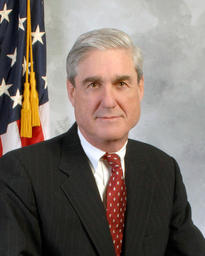 President George W. Bush nominated Robert S. Mueller III to serve as the sixth director of the FBI, and Mueller took office on Sept. 4, 2001, just one week before the Sept. 11 terrorist attacks.
President George W. Bush nominated Robert S. Mueller III to serve as the sixth director of the FBI, and Mueller took office on Sept. 4, 2001, just one week before the Sept. 11 terrorist attacks.
He is poised to step down this year, concluding a 12-year tenure in which he oversaw the transformation of the FBI from a law enforcement agency focused primarily on criminal investigation to a national security service dedicated to preventing terrorism and crime.
Since 1976, FBI directors have been limited by law to a single term of no more than 10 years, but Congress extended Mueller's tenure in 2011 by an additional two years at President Obama's request, making Mueller the longest-serving FBI director since J. Edgar Hoover. At the time, Obama said Mueller had set the “gold standard” for leading the FBI and that his leadership provided stability at a time of threats facing the nation.
As director of the FBI, Mueller oversees an agency with more than 36,000 employees and a fiscal 2012 budget of around $8.2 billion.
“Robert Mueller’s accomplishments are remarkable standing alone, but his integrity, dedication, discipline and humility make him an ideal candidate for the Jefferson Foundation Medal in Law,” said Paul G. Mahoney, dean of the U.Va. School of Law.
After graduating from Princeton University in 1966 and earning a master's degree in international relations from New York University in 1967, Mueller served as a U.S. Marine Corps officer for three years, leading a rifle platoon of the Third Marine Division in Vietnam. He was awarded the Bronze Star, two Navy Commendation Medals, the Purple Heart and the Vietnamese Cross of Gallantry.
Next, Mueller attended U.Va. Law School, where he served on the Virginia Law Review, graduating in 1973. After working as a litigator in San Francisco until 1976, he spent 12 years working in U.S. attorney's offices, first in San Francisco and then in Boston, where he was appointed as an assistant U.S. attorney. Following a stint in private practice as a partner at the Boston law firm Hill and Barlow, Mueller returned to public service in 1989 as an assistant to Attorney General Richard L. Thornburgh. A year later, Mueller took charge of the Justice Department's criminal division.
Mueller became a partner at the Boston law firm Hale and Dorr in 1993, where he specialized in white-collar crime litigation.
In 1995, Mueller joined the District of Columbia U.S. Attorney's Office as senior litigator in the homicide section. In 1998, he was appointed as a U.S. attorney in San Francisco, a position he held until his call to lead the FBI.
